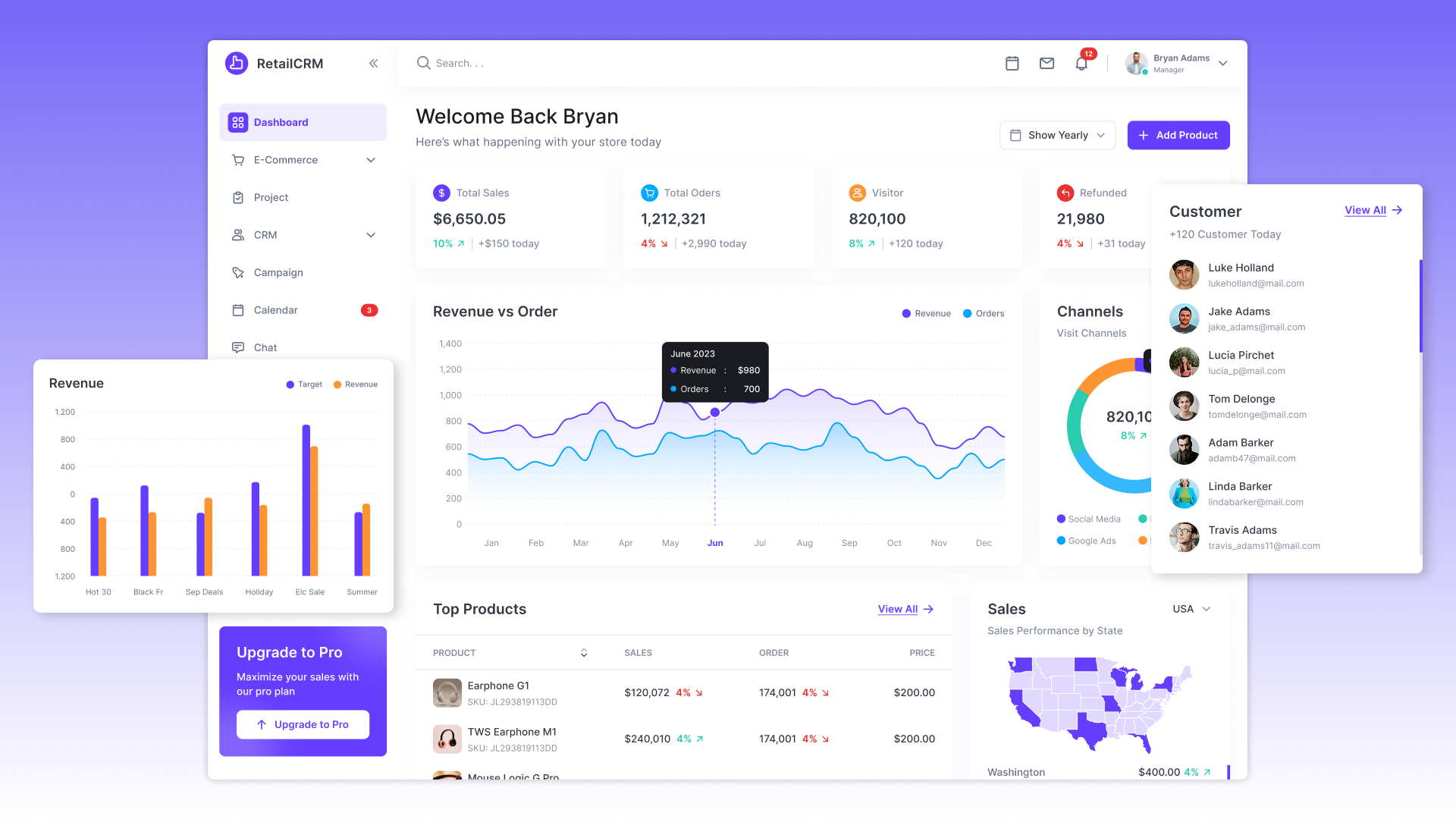
The modern eCommerce space is a dynamic environment where competition is intensifying every moment. Customers are becoming more demanding, and their expectations for personalization and speed of service are constantly increasing. Therefore, the success of your online store currently depends not only on the quality of the goods, but also on effective customer relationship management. When standard solutions are no longer enough, it means that it’s time to order a CRM system for an online store that is fully adapted to your business.
AVADA MEDIA provides services for the development, adaptation and scaling of CRM systems for eCommerce. Our specialists create flexible solutions that adapt to the specifics of each online store. We take a deep dive into the client’s needs, offer the optimal architecture, implement the necessary integrations and provide reliable technical support. You can order a CRM from us, which does not limit, but accelerates the development of your online store.
eCommerce CRM is a multifunctional tool for online stores looking to automate online sales, improve customer interactions, and increase profits. That is, it is not just a customer database, but a smart system. If you decide to order the development of a CRM for an online store, you will get many advantages.
Automation of online trading
CPM for an online store automates routine tasks such as processing and tracking order statuses, sending email newsletters and managing warehouse inventory, forming a sales funnel, and generating reports. Online store automation frees up time to focus on more important processes – business development and attracting new customers. CRM functionality allows owners and managers to see the full picture: from the sales funnel to financial indicators in real time.
Centralized customer database
All information about your customers – from contact details to purchase history – is stored in one place. This allows you to get a complete picture of each customer, their needs and the history of interaction with the store.
Remote Access
When developing a CRM, it is imperative to create an adapted mobile interface or a separate application that allows you to manage orders, analytics, and communications in real time. It is convenient for managers, remote workers, or agents.
Integration with other systems
A modern CRM of an online store integrates with all communication channels. Online store, marketplace, email, instant messengers (Telegram, Viber, WhatsApp), telephony, chatbots, social networks – all points of sale are synchronized in a single system. This allows you to create a single service environment where the history of communication with the client is stored regardless of the channel.
Personalization of marketing
With the help of a CRM system, online stores can segment their audience, personalize their offers and marketing campaigns. By taking into account the individual preferences of customers, you can offer them the most relevant products and discounts, increasing the likelihood of purchase and the effectiveness of advertising.
Increase customer trust and loyalty
CRM for goods allows you to improve interaction with customers with the help of omnichannel support – automated triggered email newsletters, chatbots, SMS, push notifications. This allows you to respond quickly and efficiently to customer queries, solve their problems, and provide them with personalized support. Also, thanks to gamification, loyalty programs, bonuses for repeat purchases, and personalized congratulations on events, customers become more loyal.
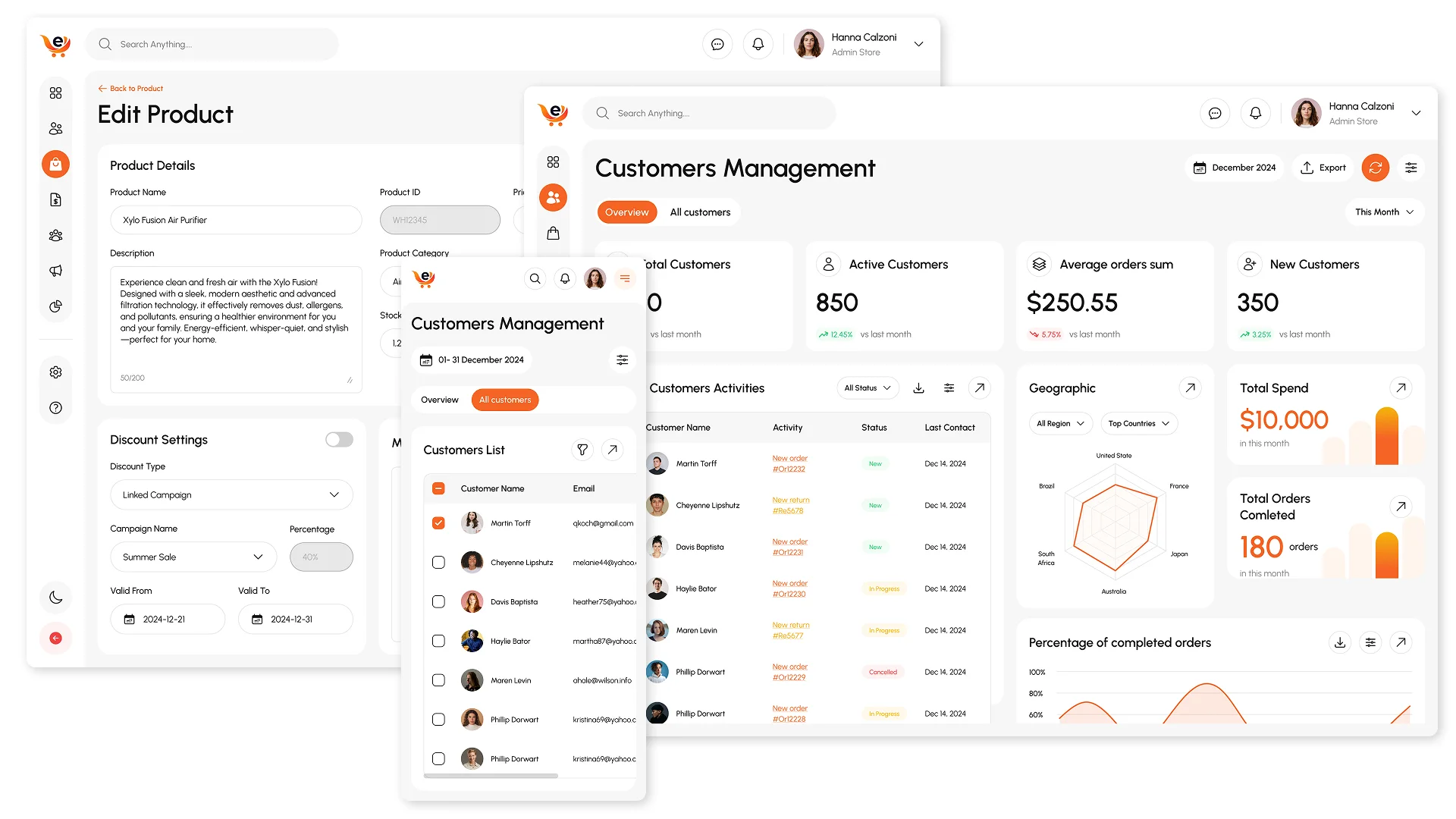
Increase the number of repeat purchases
Intelligent CRM algorithms allow you to generate personalized recommendations based on purchase history, preferences, and user behavior. This helps to launch effective remarketing campaigns by incentivizing repeat orders and increasing the average check.
Speed up order processing
Automation of online sales takes over routine operations for processing orders: generating invoices, confirming the availability of goods, transferring the order to logistics. Thanks to this, customers are more satisfied because they receive their purchases faster, and employees make fewer mistakes and delays.
Reducing the number of lost leads
The CRM captures each request and reminds managers to answer or call. Thus, potential buyers are not lost, even if they applied through several channels at the same time: instant messengers, social networks, or a form on the website.
Reducing marketing costs
Thanks to centralized data collection, the system allows you to accurately analyze the effectiveness of each advertising campaign, segment the audience by relevant characteristics. A detailed analysis of user behavior allows you to use advertising more efficiently and avoid unnecessary costs.
Omnichannel
CRM for eCommerce provides seamless integration with payment systems, delivery services, warehouse applications, and supplier platforms. This allows you to automate payment processes, control the balance of goods, optimize logistics and ensure timely replenishment of the warehouse. As a result, your business works faster, more efficiently, and with minimal expenditure of resources.
Informed decisions
A CRM for online stores can have tools for in-depth data analysis. It integrates with BI systems and all sales channels, stores all information about customers, their actions, orders, complaints, and feedback in one window. The program takes analytics to the next level by providing detailed reports, KPI boards that reflect sales dynamics, filtering by categories, managers, days of the week, devices, etc. This allows you to build effective business strategies based on data rather than intuition.
Automation of online stores is an important condition for the growth and competitiveness of an eCommerce business. An individual CRM system helps companies of all sizes achieve their goals.
CRM for online stores from AVADA MEDIA is modern custom solutions that are fully adapted to the specific needs of your business.
CRM for a hardware store
Implementing a CRM for an online store is a necessary step for success in the digital age because it changes the way businesses work at all levels. Let’s consider exactly what functions a CRM can have for a product, and how it helps to increase the efficiency of your business.
Management of orders and their statuses
CRM covers the full cycle of work with orders: from receipt to delivery. The system automatically changes statuses (new, processed, transferred for delivery, completed or canceled), synchronizes with payment and delivery services, and sends notifications to customers. It works like this: after placing an order, CRM creates a task for the manager, generates a warehouse invoice, generates a consignment note for logistics, and sends the buyer a confirmation email.
Personal customer cards
In CRM, each client has his own digital card with a history of orders, payments, support calls, reviews, communication channels, and marketing activities. This allows managers to quickly navigate the situation and build high-quality personalized interaction. For example, if a manager sees that a client last bought cosmetics a month ago, opens email newsletters frequently, and has a birthday tomorrow, it may be quite appropriate to offer him a personal discount.
Automatic notification and trigger system
The CRM monitors customer activity and triggers trigger scenarios: abandoned cart reminders, order status change notifications, points exhaustion notifications, or a new promotion. How it works: if the buyer added the product to the cart but did not complete the purchase within 2 hours, the system sends an email reminder with a promo code -10%.
Flexible customer segmentation
The intuitive interface allows you to filter customers according to any criteria: average check, frequency of purchases, reactions to promotions, geolocations, product categories, traffic sources, activity, region, etc. This paves the way for ultra-precise marketing and increasing the ROI of each campaign. For example, you can create a segment “men from Kyiv who spent more than 4000 UAH in March” to launch an SMS campaign with the novelty of the season.
Integration with delivery services
After payment, the system will automatically pull up the transaction status, send an application to the selected courier service (Nova Poshta, Meest, DHL, etc.), receive a consignment note number and synchronize it with the client’s personal account.
Integration with financial services
An individual CRM can be integrated with 1C, BAS, QuickBooks, Zoho Books or other financial accounting systems, which allows you to synchronize data on sales, payments, returns, receivables. That is, all successful payments are automatically recorded in the accounting system, and returns are approved without the need for manual duplication.
Loyalty programs and bonus systems
CRM systems for selling an online store help to implement customized loyalty programs: accumulating points, accruing cashback, promo codes, personal birthday discounts, coupons for repeated purchases, referral programs – everything can be customized to your brand strategy. This drives repeat sales and increases LTV (Lifetime Value), i.e. “customer lifetime value”.
Accounting of commodity balances in real time
The system can pull up data from several warehouses, warn about a decrease in balances, block sales in the absence of goods, and set up auto-orders to suppliers.
Analytics and reporting
CRM can visualize data in real time. Graphs, dashboards, tables with any key metrics: sales by category, popular products, order dynamics, traffic channels, average check and effectiveness of marketing campaigns, margin, LTV dynamics. For example, the owner sees in the dashboard that Facebook Ads gives fewer orders, but a higher average check and a lower rate of returns, so he can optimize the advertising budget.
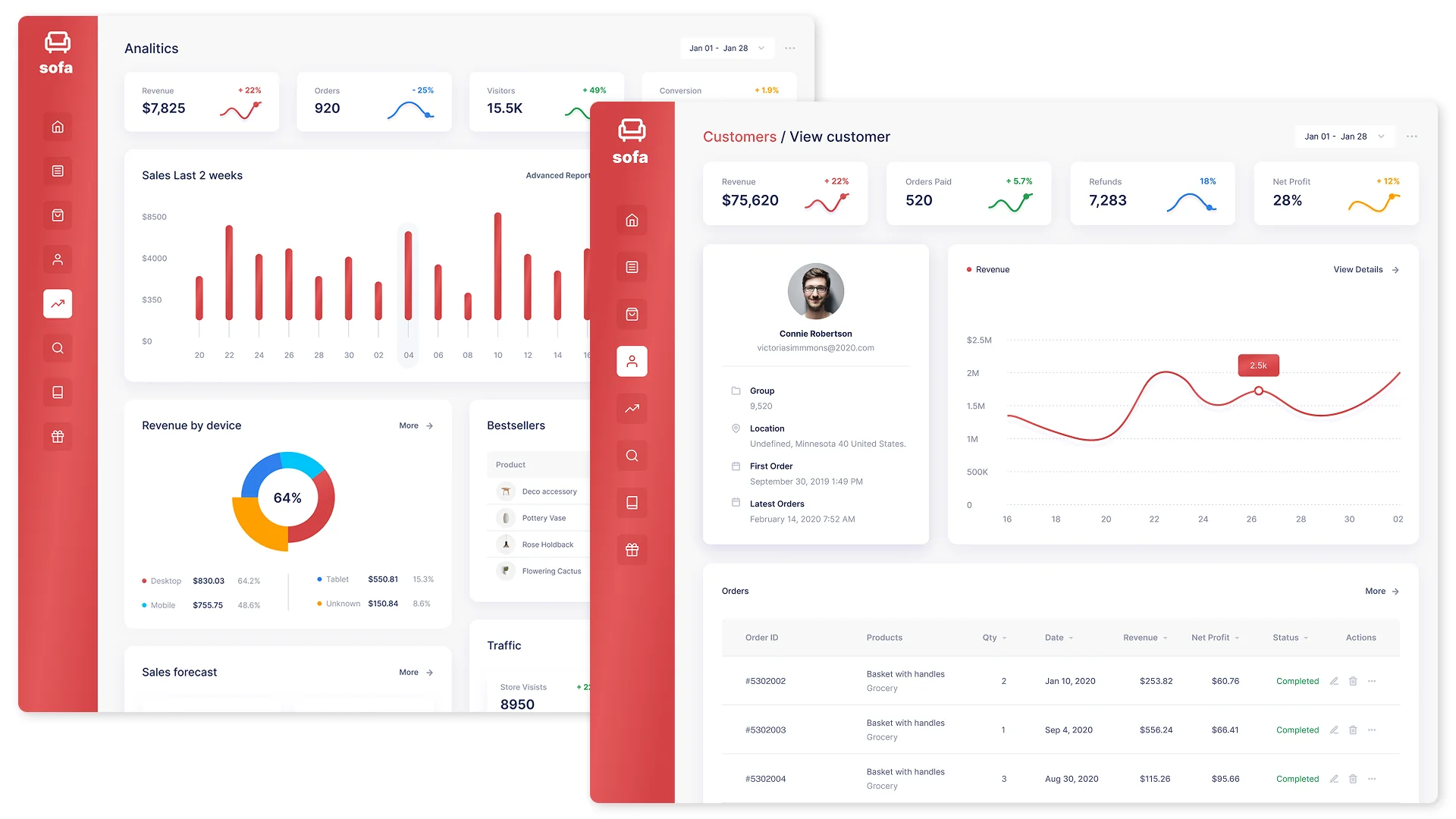
B2B (wholesale) modules
CRM for an online store allows you to serve not only retail customers, but also wholesale partners. Separate functions for working with wholesale partners: formation of special prices and delivery terms, automatic generation of contracts, individual promotions. Your partner can log in to their account, see their discount level, and place an order through the template in one click.
Complaint and return management
With the management system, the client can submit a request for a refund or complaint through their personal account or manager. In CRM, a case is automatically created with a photo, description, communication history, and statuses at each stage. How it works: the buyer complains about the damaged product – the CRM records the request, appoints the person responsible, sends a confirmation letter and launches compensation measures. That is, the process is transparent, controlled and documented.
Integration with advertising accounts and analytics
In CRM, you can set up data transfer to Google Ads, Meta, email services, Google Analytics, Pixel, etc. for more precise targeting and tracking of user behavior. That is, a list of customers with a high LTV can be automatically imported into Facebook Ads to launch a personalized retargeting campaign.
Employee Management Module
Advanced analytics allows management to track the key performance indicators of each manager: the number of orders processed, the average response time, and the level of customer satisfaction. In turn, managers see clear tasks, customer statuses, order history, and the actions of colleagues. This creates a transparent motivational system for the sales and service team.
Automation of cross-selling and upselling
The system can create recommendations based on the analysis of previous orders, preferences, product categories and the average check. It automatically selects related or more expensive products and shows them to the customer at key points in the purchase path. For example, a customer adds a laptop to the cart, and the system offers a bag, mouse, extended warranty or discounted software. Case and power bank with a 10% discount.
Working with marketplaces
CRM combines orders, delivery statuses, and leftover goods from marketplaces (Rozetka, Prom, Amazon, Etsy, Shopify). This allows you to centrally manage sales from all channels: synchronize orders, track and update balances, manage prices without manually duplicating information. That is, the manager sees all orders from the online store and marketplace in one interface, and the system itself updates the balances after each sale.
Intelligent procurement forecasting system
Based on sales analytics, seasonality, and trends, the program predicts when and what products need to be purchased. Moreover, a CRM system for an online store with warehouse maintenance can automatically generate requests for replenishment, taking into account delivery time, balances and sales rates. For example, the program in April will tell you that sales of air conditioners increased sharply last May, and offer to replenish the balances in advance.
Product Inventory Management
CPM for an online store allows you to create a complex assortment structure: categories, tags, brands, variations, dependencies between products (for example, recommended accessories). You can also automate product feed updates for marketing channels. For example, create a filter “New + More than 20% off” and export it as a dynamic feed for Google Shopping.
Work with suppliers
CRM allows you to automatically generate purchase requests, update product balances, monitor delivery times, and keep a history of cooperation with each counterparty. The system also analyzes the popularity of goods and forms recommendations for purchases.
Automated Marketing Scripts
The application for an online store can build automated multi-level communication scenarios (email, SMS, push, instant messengers) taking into account customer behavior, the time of the last purchase, reaction to promotions, etc. How it works: 3 days after buying cosmetics, a letter with care advice is sent to the client, after 10 days – a reminder to buy again, after 20 – a review bonus.
Logistics optimization and document flow
The store’s CRM can be integrated with courier services (Nova Poshta, Ukrposhta, Meest, etc.) to automatically update the status, generate and print consignment notes, and add to the pdf package to the order. It is also possible to create invoices, acts, expense documents, returns – and all this happens without human intervention, that is, with a minimum probability of errors.
Management of support services
With CPM, an online store can implement a support service with the distribution of requests, automatic responses, templates, SLA control, and storage of communication history with each client.
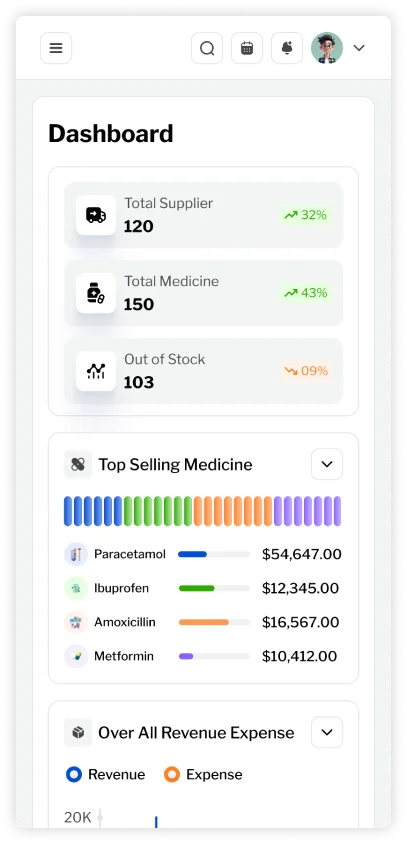
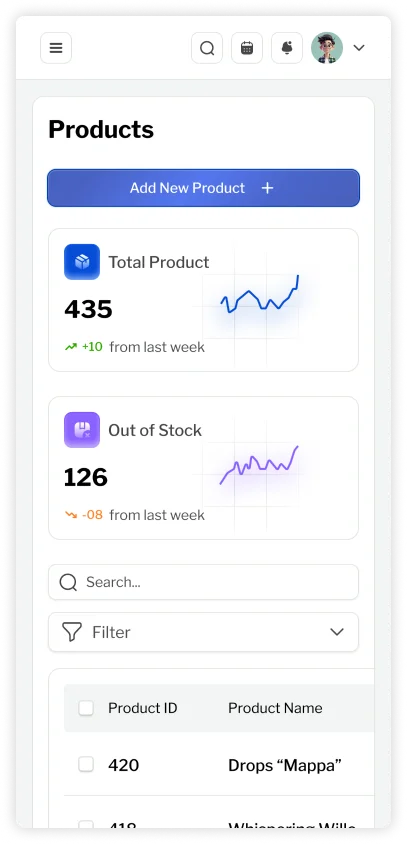
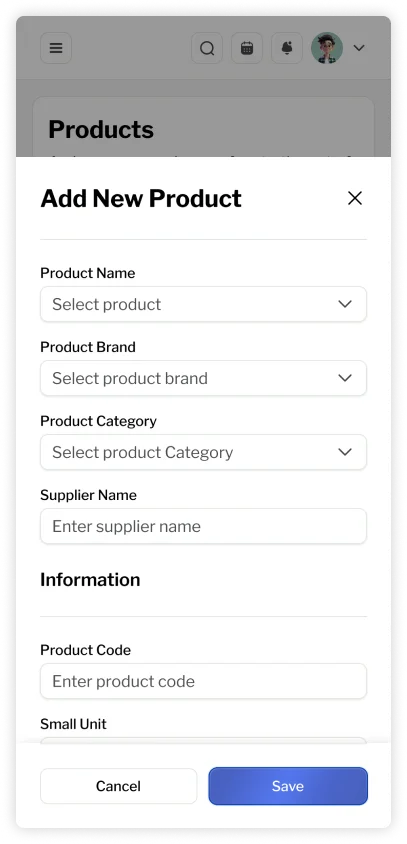
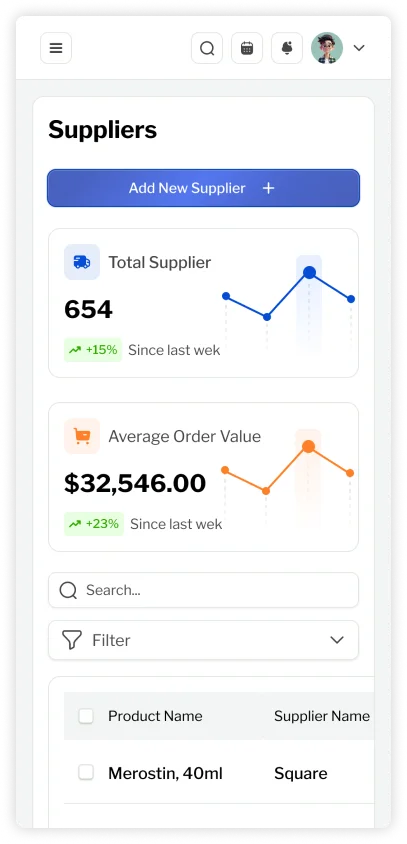
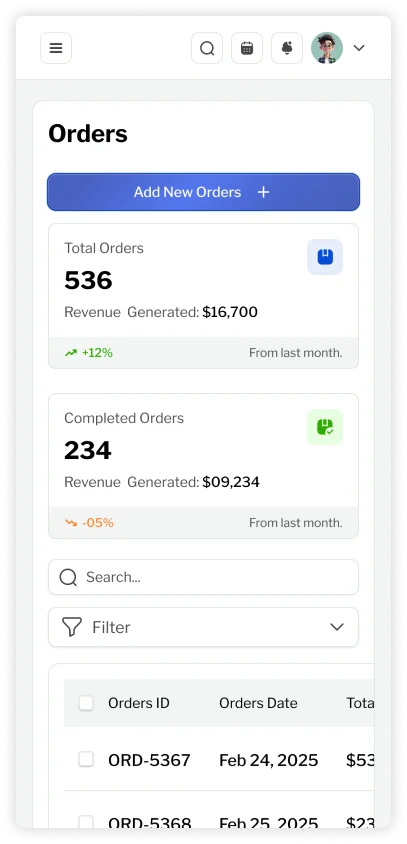
Mobile version of CRM for sales management
Automation of the work of an online store is not just the implementation of new software, but also a strategic solution for scaling your business. The development of a CRM online store takes place in several stages.
Creating a CRM for an online store begins with a detailed study of the specifics of the business and determining:
Based on the analysis, a document is created containing a detailed description of the main modules of the eCommerce CRM, the architecture of the system and its scalability, requirements for integrations with external services, marketplaces, CMS (Shopify, OpenCart, Magento, WooCommerce), the logic of process automation (for example, automatic updating of the order status, accrual of bonuses, reminders of repeated purchases).
This is one of the most important stages of CRM development for online stores, where an interface, user scenario diagrams, and prototypes of the main screens for UX testing are created. A CRM system for a commodity business should have a minimalistic, intuitive, and structured interface with a logical arrangement of elements so that users of different devices have the ability to quickly access orders, customer base, analytics, and reporting. When forming the logic of interaction of modules, all the details are taken into account: how the manager will process orders, how the warehouse will be updated, how sales statistics will be displayed. That is, a prototype is an interactive layout that demonstrates its interface and main functions.
At this stage, they also choose the technologies that will be used to develop CRM for the commodity business: programming languages, databases, server equipment, etc. Before final development, the prototype is tested on real users to evaluate usability and identify possible shortcomings.
CRM design stage in Moqups environment
The development of a software product design should correspond to the visual style of the online store, take into account the brand book, be adapted for all devices and users, and provide a balance between aesthetics and functionality with a focus on intuitive control.
The main part of developing an online store CRM system is writing program code. It is important to ensure close interaction between backend and frontend developers and to hold regular meetings to discuss progress and make necessary changes. Also at this stage, the integration of CRM and the online store, marketplaces, advertising platforms and analytical services (Google Analytics, Facebook Pixel), and the configuration of APIs for two-way data exchange takes place.
CRM testing includes checking all functions for compliance with the terms of reference, interface convenience, speed and stability of work under load, security, and data protection from unauthorized access. At this stage, it is important to identify and correct all errors. After completing CRM testing, the online store is ready for its implementation, that is, deployment on the customer’s server.
We don’t just hand over a ready-made system to you, but make sure that your team gets a tool that they can use effectively. We train employees to work with the program at all levels – from basic operations to advanced functions, providing instructions, video tutorials and consultations.
After the implementation of a CRM system for eCommerce, they need technical support and regular updates, bug fixes, and the addition of new features when changing business processes or scaling your store.
CRM development for online stores is a complex technological process that requires the use of a wide range of tools and technologies. They allow you to create a commodity CM faster, with lower costs, and the ability to scale as the business grows.
The choice of technologies depends on the budget, timing, complexity of the project and the client’s requirements. Our specialists use modern proven solutions that guarantee stable operation of the system.
CRM system for an online shoe store
Order a CRM for commodity business from AVADA MEDIA if you need a custom solution that integrates perfectly into your business, optimizes processes, and helps you scale. Our advantages:
What are the advantages of custom CRM development over ready-made solutions?
An individual CRM is fully adapted to your company’s business processes. It does not contain unnecessary functionality, but only those tools that you need. This increases efficiency, reduces support costs, and allows you to scale without limits.
Is it possible to integrate a customer management system with existing platforms?
Custom CRM of the commerce segment is easily integrated with CMS (Shopify, OpenCart, WooCommerce), payment systems, delivery services, 1C, marketplaces, and other services. As a result, all business processes work in one interface.
How long does it take to develop and integrate a CRM and an online store?
The timing depends on the functionality and scope of work within the project. Usually, the basic version is developed in 3-4 months, a full-fledged system requires more time.
Is it possible to migrate data from an old CRM system?
Yes, you can transfer data from the previous system – customers, order history, payments, requests, and more. The process takes place under the control of the technical team without loss of information.
Do you provide support after CRM implementation?
Yes, after launch, we provide technical support, updates, consultations, and expansion of functionality. We work as a technical partner on a long-term basis.
How much does it cost to order a CRM for an online store in Ukraine?
The price of developing a CRM system for an online store in Ukraine depends on the complexity of CRM development – the number of functions, users and integrations, design features.
Is it possible to gradually expand the CRM after launch?
Yes, you can break the project into stages to implement an MVP faster. That is, we launch basic functionality, and later add new modules: analytics, logistics, B2B, marketing automation, etc.
Is it possible to integrate CRM with several online stores at the same time (on different CMS or marketplaces)?
Several stores can be connected to an individual CRM, even if they work on different platforms (Shopify, OpenCart, WooCommerce, Prom.ua, etc.). All orders and customers will be centrally collected in one interface with separation by project or brand.
Can CPM for online stores respond to peak loads, for example, during sales?
In the system, you can set rules for priority processing of orders, automatic scaling of tasks between managers, increasing the frequency of updating balances or enabling temporary sales limits if the product runs out, as well as communication templates are available in case of delays.
What level of security does CRM provide for customer personal data?
Connection-level encryption (SSL), access rights delimitation, two-factor authorization for managers, and a log of user activity are used. Individual CRM complies with the requirements of the GDPR and Ukrainian legislation regarding the storage and processing of personal data.
Our works
Contact the experts Have a question?
Developed by AVADA-MEDIA™
The user, filling out an application on the website https://avada-media.ua/ (hereinafter referred to as the Site), agrees to the terms of this Consent for the processing of personal data (hereinafter referred to as the Consent) in accordance with the Law of Ukraine “On the collection of personal data”. Acceptance of the offer of the Consent is the sending of an application from the Site or an order from the Operator by telephone of the Site.
The user gives his consent to the processing of his personal data with the following conditions:
1. This Consent is given to the processing of personal data both without and using automation tools.
2. Consent applies to the following information: name, phone, email.
3. Consent to the processing of personal data is given in order to provide the User with an answer to the application, further conclude and fulfill obligations under the contracts, provide customer support, inform about services that, in the opinion of the Operator, may be of interest to the User, conduct surveys and market research.
4. The User grants the Operator the right to carry out the following actions (operations) with personal data: collection, recording, systematization, accumulation, storage, clarification (updating, changing), use, depersonalization, blocking, deletion and destruction, transfer to third parties, with the consent of the subject of personal data and compliance with measures to protect personal data from unauthorized access.
5. Personal data is processed by the Operator until all necessary procedures are completed. Also, processing can be stopped at the request of the User by e-mail: info@avada-media.com.ua
6. The User confirms that by giving Consent, he acts freely, by his will and in his interest.
7. This Consent is valid indefinitely until the termination of the processing of personal data for the reasons specified in clause 5 of this document.
Send CV
Contact us in any convenient way for you:
+ 38 (097) 036 29 32